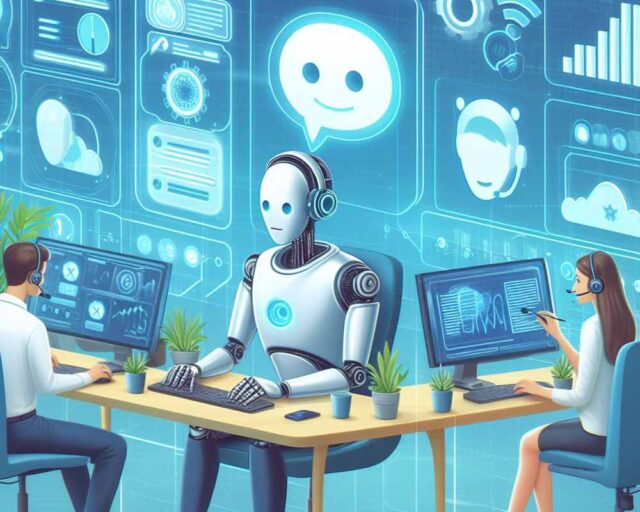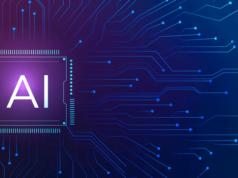AI in Customer Service: Improving User Experience through Chatbots
Introduction
In the quickly evolving computerized circle, businesses are continuously in quest for inventive ways to deal with hoist customer satisfaction and upgrade their activities. A transformative force in the domain of customer service is (AI), a groundbreaking technology reshaping customary practices. AI-powered customer service, eminently through the integration of chatbot technology, stands apart as a vital innovation, in a general sense altering the elements of business-customer interactions. This article digs into the different jobs played by AI in customer service, with a particular accentuation on chatbots and their ability in enhancing the general user experience.
AI-Powered Customer Service: A Paradigm Shift
The coming of AI has introduced another time in customer service. Customary customer support models are evolving, with businesses increasingly adopting AI-powered solutions to give more effective and personalized services. AI-driven customer service goes past fundamental automation; it use trend setting innovations, for example, machine learning, natural language processing (NLP), and conversational AI to make intelligent and responsive frameworks.
Chatbot Technology: The Face of AI in Customer Service
Leading the charge in AI-powered customer service is chatbot technology. Created as virtual assistants, these substances have practical experience in interacting with users in a conversational style, furnishing quick help and information. Chatbots exhibit astounding proficiency in managing routine inquiries, resolving difficulties, and adroitly guiding users through intricate cycles — all progressively. To guarantee quick and effective service nonstop, businesses are seamlessly incorporating chatbots into their customer support channels
Customer Experience Automation: Redefining Interactions
AI-energized customer experience automation is revolutionizing the way that businesses draw in with their customers. Through the automation of unremarkable errands and interactions, organizations can divert HR toward more intricate and esteem-situated attempts. The execution of AI-driven automation ensures a uniform and seamless experience across numerous touchpoints, nurturing customer devotion and general satisfaction.
Virtual Assistants for Customer Support: Beyond Human Limitations
Virtual assistants powered by AI are augmenting customary customer support gatherings. These intelligent experts can manage a lot of tasks, from answering a large part of the time-presented inquiries to guiding users through troubleshooting processes. Virtual assistants give instant responses, eliminating the prerequisite for customers to wait in extensive lines or investigate complex IVR structures, thus enhancing the overall efficiency of customer support undertakings.
Conversational AI: A Natural Interaction Experience
Conversational AI lies at the center of strong chatbot technology. This top tier capacity engages chatbots to partake in natural, human-like conversations, making interactions more intuitive for users. The integration of natural language understanding and age ensures that chatbots handle user questions definitively and reply in a manner that impersonates human conversation, contributing to a positive user experience.
Enhancing User Experience with AI: A Strategic Imperative
Improving user experience (UX) is an essential basic for businesses seeking to remain serious in the present market. AI assumes a vital part in this undertaking by providing personalized and setting mindful interactions. By analyzing user inclinations, conduct, and verifiable information, AI-powered frameworks, including chatbots, can tailor reactions and suggestions, contributing to a seriously satisfying and engaging user experience.
Chatbot Solutions for Businesses: Tailoring to Unique Needs
Chatbot solutions are not one-size-fits-all; businesses need tailored ways to deal with dealing with and meeting their extraordinary essentials. AI-powered chatbots can be changed to line up with the brand character, industry-unequivocal nuances, and the opportunity for customer questions. Whether conveyed for online business, clinical benefits, or finance, chatbot solutions offer a flexible toolset for businesses to encourage customer interactions and drive supportive proficiency.
Automated Customer Interactions: Efficiency at Scale
One of the essential benefits of AI in customer service is the ability to manage a titanic volume of interactions meanwhile. Automated customer interactions, worked with chatbots, and attracted businesses to scale their support rehearses favorably. This versatility ensures that customer inquiries are tended to practically, reducing wait times and improving all-over responsiveness.
Machine Learning in Customer Service: Adapting to Dynamic Needs
Machine learning estimations power the adaptability of AI structures. With respect to customer service, machine learning engages chatbots to gain from irrefutable interactions and continuously work on their performance. This adaptability ensures that the chatbot remains significant and compelling in addressing evolving customer needs and inclinations.
AI-Driven User Support: Proactive Problem Resolution
AI-driven user support is described by its proactive way of dealing with issue goals. Chatbots can distinguish potential issues in view of user conduct and examples, providing preplanned solutions before issues heighten. This proactive critical thinking improves customer satisfaction as well as adds to a more sure view of the brand.
Improving Customer Satisfaction with AI: A Quantifiable Impact
Customer satisfaction is a definitive proportion of the outcome of any customer service system. AI, especially through chatbot technology, quantifiably affects customer satisfaction levels. The speed, precision, and personalization of interactions add to a positive customer experience, fostering dedication and promotion.
Natural Language Processing in Customer Service: Understanding User Intent
Natural Language Processing (NLP) is a foundation of compelling correspondence among people and AI frameworks. In customer service, NLP permits chatbots to grasp user intent, settings, and feelings. This linguistic capacity empowers chatbots to give logically applicable and genuinely intelligent reactions, mirroring the nuanced idea of human correspondence.
Benefits of Chatbots in User Experience: A Holistic Approach
The benefits of incorporating chatbots into customer service loosen up past efficiency gains. Chatbots add to a comprehensive improvement in user experience by offering every day of the week availability, reducing response times, and ensuring consistency in information dissemination. Furthermore, the information assembled through chatbot interactions can be used to moreover refine and redo the overall user experience.
Personalized Customer Interactions through AI: Tailoring Experiences
Personalization is a basic driver of customer satisfaction, and AI works with personalized interactions at scale. Through the investigation of user information, inclinations, and approaches to behaving, chatbots can tailor responses and proposition to individual users. This level of personalization develops a feeling of affiliation and importance, enhancing the overall user experience.
AI in Customer Relationship Management (CRM): Building Strong Connections
Integrating AI, including chatbots, into Customer Relationship Management (CRM) frameworks upgrades the capacity to construct and maintain solid associations with customers. Via automating routine undertakings, providing personalized suggestions, and ensuring reliable correspondence, AI adds to a more vigorous and powerful CRM system.
User-Centric Chatbot Design: Prioritizing User Needs
Compelling chatbot design is inherently user-centric. To enhance the benefits of AI in customer service, businesses ought to zero in on user necessities and inclinations in the design and plan of chatbots. User-centric chatbot design involves creating intuitive interfaces, refining conversational streams, and incorporating analysis circles to continuously further develop the user experience.
Automation in Customer Support: Redefining Workflows
Automation in customer support, driven by AI, is redefining conventional work processes. Routine errands that were once tedious and asset-intensive can now be automated, allowing human specialists to zero in on more perplexing and high-esteem interactions. This rearrangement of undertakings improves the asset portion and adds to a more proficient and coordinated customer support biological system.
Intelligent Virtual Assistants: Beyond Scripted Responses
Gone are the times of prearranged and unbending interactions in customer service. Intelligent virtual assistants, powered by AI, go past prearranged reactions. These virtual assistants influence relevant understanding and machine learning to give nuanced and versatile reactions, ensuring a more valid and engaging interaction with users.
AI for Seamless Customer Interactions: Breaking Down Silos
Silos in customer interactions can bring about divided and disjointed experiences. AI goes about as a unifying force, breaking down storehouses by providing a seamless and integrated way to deal with customer interactions. Whether a user connects through a site, a versatile application, or virtual entertainment, AI guarantees a steady and durable experience across all touchpoints.
Enhancing UX through Chatbot Technology: A Continuous Evolution
All things considered, the integration of AI, expressly chatbot technology, is a transformative force in customer service, generally enhancing user experience. From personalized interactions and proactive issue objectives to the entire day, regular availability, and streamlined work processes, the benefits of AI in customer service are gigantic and change. As businesses continue to utilize the force of AI-driven solutions, the improvement of customer service towards a more intelligent, viable, and user-centric model is prepared to continue. What the future holds exciting possible results as AI continues to move, pushing the restrictions of what is reachable in the domain of customer service and user experience.








